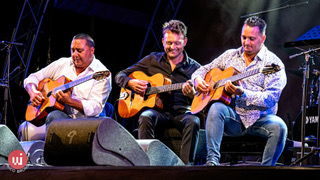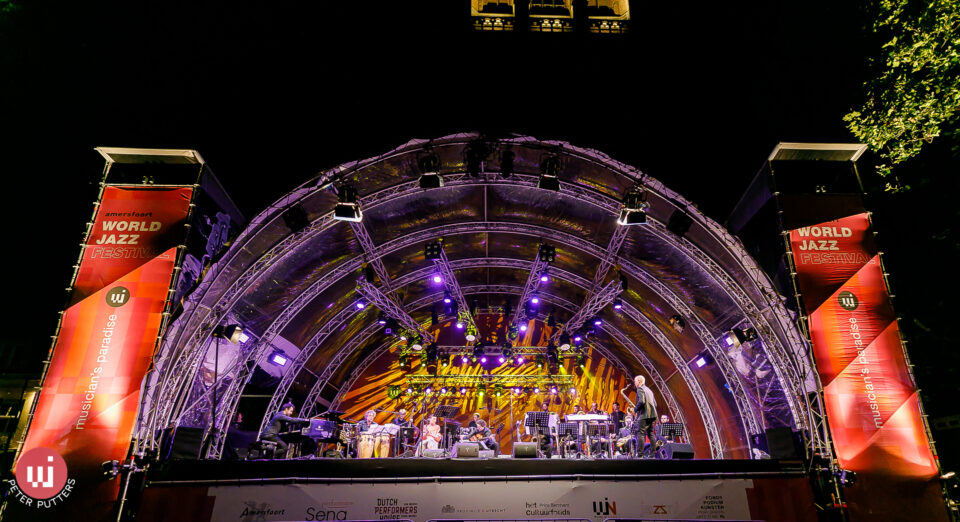Review: The Amersfoort World Jazz Festival: The Music
The festival was tagged a ‘musician’s Paradise’ and indeed it was. Musicians had multiple opportunities to play and to mingle with press and audience alike, which also made it a listener’s paradise!
The Amersfoort World Jazz Festival was a jazz festival involving over 350 musicians from several countries, each contributing a different flavor to the musical palette.
A luxury in modern jazz performance is the presence of a jazz big band. It is, first of all difficult to assemble a group of 18 or so musicians to form a big band, leave alone the logistics of writing and arranging the music and having multiple rehearsals with the ensemble.
For the audience, it becomes a treat, but it is also a rarity to get to enjoy such a band. Big bands played on each of the six days of the festival. In fact, there were multiple big bands on show every day, a jazz connoisseur’s delight. The main stage was located perfectly in the middle of the town square at an elevation of about two meters. Behind the stage, as if an extension of the setup is a 15th-century tower, almost a hundred meters high and beautifully lit up at night.
There were seats and tables for the audience to enjoy a beverage and snack as they soaked in the music in a naturally informal atmosphere. Surrounding the seating area were open-air cafes on both sides and restaurant patrons could also enjoy the jazz with a fine view of the stage.

On the opening day were two large jazz bands. One featured Latin and Caribbean music and the second band was a Cuban band. The Caribbean band, CaboCuba jazz featured the extraordinary vocalist Izaline Calister from Curacao and musicians from several parts of the Caribbean region and South America.
The second band, Steven Brezet led Latin Project band was an authentic Cuban band with multiple percussionists, including Brezet, a brass section with trombone, saxophone and trumpet, three vocalists, piano, bass and also a couple dancing on stage. These two bands on opening night challenged the audience to sit still and a large number took to the floor to dance to the compelling sounds from Cuba and the Caribbean. The lively spirit on stage from both these bands could only be matched perhaps by a balle balle song and dance at a Punjabi wedding!
As these big powerhouse bands were plying their trade, a small, smoky jazz club appropriately named “Miles” hosted an unusual theme: Women in Jazz. Several very talented ladies played their trumpets, saxophones, guitars, piano, bass and drums and voice in various combinations. The music was as uniformly good as it was lively. Women jazz players from countries as varied as Surinam (Dutch West Indies), Ukraine and several parts of Europe took turns in this session.
Simultaneously at another venue was Paul van Kessel playing guitar and singing with his acoustic trio. There were two or three other acts at the same time. It made for a painful decision, not of what to hear but rather what to miss!
The after-hours jam session brought musicians from several bands to play together. Such sessions are very enjoyable because the various musicians agree to play well-known standards, songs/tunes known to the listeners. The music is easy to identify.
A Gipsy Swing band led by masterful guitarist Mozes Rosenberg and also featuring guest guitarist Paulus Schafer played a truly dazzling set of the Django Reinhardt school and style of jazz. Rosenberg showed immense dexterity in his play. This was on the big stage.
An equally dazzling performance came from the Flamenco Big Band led by Bernard van Rossum, which featured a flamenco vocalist and guitarist, backed by a standard jazz horn section.
One did not wish to leave this stage, yet at “Miles” were the bands of Anna Serierse singing from her new album as well as that of drummer Sven Rozier. At yet another venue was a recital by the classy saxophone and flute man Lucas Santana playing with strings, actually a recording session played in a chapel, the St. Aegtenkapel. Santana is certainly a talent worth looking out for in the years to come.
Fabio Lannino playing bass led a quartet with piano, drums and a very expressive vocalist, playing well-known jazz numbers and ending with an energetic version of Ray Charles’ famous, “What’d I Say.”
Meanwhile, jam sessions continued with some impressive soloists, notably Ernesto Montenegro from the Canary Islands in Spain on trumpet, Ellister van der Molen from the Netherlands on trumpet and flugelhorn and Hungarian Joe Fritz on clarinet. These performers were heard at various performances in different bands.

“Classics meet Jazz” was the theme of the (pianist) Peter Beets-led New Jazz Orchestra. The arrangements for some familiar pieces were intricately done and Peter Beets was in fine form throughout. Some superb solos were interspersed with the creative orchestration.
An interesting exercise took place when the band “Sunrise”, featuring bassist Jurrian de Kock played while a 1927 silent film was being screened. This was a reminder of how the entertainment on screen was supplemented in the silent movie era by creative music. “Sunrise” had written and arranged the music to flow with the theme of the film.
Meanwhile the very popular Dutch Hip Hop artist Typhoon played several sets on each day, yes to full houses!
Typhoon also ruled center stage on the fourth day of the festival. His versatility and his popularity with young audiences is quite remarkable. Hopefully, they stayed on for some of the other shows as well. One reaches the art of jazz in many ways!
Very highly rated young jazz pianist Chi played with the Dafa Trio. We had heard of her piano skills and were impressed by her subtle work. She is another one to be marked for the future.

Is there a time and a place for enjoying jazz? Does the same jazz music sound different in different locations? Rather like “Does a gourmet coffee taste the same in a styrofoam cup as in bone china?”
Before getting too esoteric about this, we experienced the impact of a location on the sound and the mood it created. On Saturday at the Amersfoort festival, a recital was held in a beautiful church, St. Joriskerk and was quite an experience to hear the huge pipe organ of the church used while two soloists, Koh “Mr Saxman” from Thailand on saxophone and a trumpet played rich, beautiful melodies. The church with its very high ceiling and wonderful acoustics made this music sound almost unreal. No other venue could have created this musical magic for the large audience.
The selection of a restaurant patio for its casual atmosphere, a chapel for its setting, a jazz club for its atmosphere, a theatre for its ambiance, a church for a surreal impact and a large stage for its thrust of acoustically perfect sound were the inspired locales for the jazz on display.
The large stage invited “Big Band on the Move” featuring Lucas Santana on his saxophones and Joe Fritz on clarinet for yet another brassy display of big band sound. Later the “Jazz Orchestra of the Concertgebouw” featured nominees for the Edison Awards – a Dutch version of the Grammy Awards.
An Indo-Dutch fusion session, Monsoon Raga Project featuring Sebastiaan van Bavel on piano played on Saturday.
The finale on Sunday consisted of a series of Jam Sessions at the main stage. “Licks & Brains” finally featuring Alexander Beets’ fine tenor sax, Eric Vloeimans and Koh Mr. Saxman.
The “NY Round Midnight Orchestra“ brought in vocalists Baer and Lizzie and the final offering of the festival was a free-for-all big band jam appropriately titled “Director’s Summit” where Festival director Alexander Beets led the way in a roaring musical climax. As this drew the curtain on the Amersfoort World Jazz Festival of 2023, Beets was heard saying, “Now I can have a beer!”
It was just the right amount of jazz for the audience, just as it was the right opportunity for all the delegates of the World Jazz Conference to meet, mingle and maximize their interaction.
Was there a downside to this festival? With all this variety and scope for a jazz connoisseur, was there something missing?
There were two areas where we felt a bit let down. One, for a World Jazz Festival with people coming from a great many countries, we found that announcements were made mainly in Dutch. We would have hoped for these to be made in English to be more inclusive.
The second is a personal, subjective, perhaps a minor observation. Throughout the six days of the festival, we did not hear enough of the feel of the blues in the jazz playing. Those blue notes are the soul of jazz.
Other than that we rate the Amersfoort World Jazz Festival a perfect ten. May there be many more.
All photos courtesy of the Amersfoort World Jazz Festival.
Sunil Sampat is a jazz critic and Contributing Editor of Rolling Stone India. Write to Sunil at jazzwala@gmail.com





